It took until Game 4 of their series against the San Jose Sharks for the Anaheim Ducks to play hockey. And they played a terrific game against the Sharks. Only two problems. First, they weren’t enough better than San Jose to win the game, and second, they’d given themselves zero room for error.
Game 4 of the series was the sort of game I expected every game in the series. It was tough, tight and competitive. It’s too bad for the Ducks that they tossed away the first three games in the series.
Sharks Strike First
The Sharks’ best period of Game 4 was the first one. And really, it was just the first half of the first period. It featured another goal from fourth-line forward Marcus Sorensen, his third tally of the series. The Sharks’ Melker Karlsson retrieved the puck behind the net and it eventually worked back to Brent Burns at the point. Burns fired a shot towards the net. Ducks goalie John Gibson stopped the initial shot, but Sorensen got another hack at the puck from in close. Gibson stopped the second attempt. But Sorensen persisted, fishing out the rebound despite getting knocked down to one knee. He gave himself just enough space to lift the puck over the outstretched Gibson. Ducks center Ryan Getzlaf had slipped behind Gibson to create another layer to stop the puck. Getzlaf got his hand on the shot, but it was not enough to stop it from crossing the goal line.
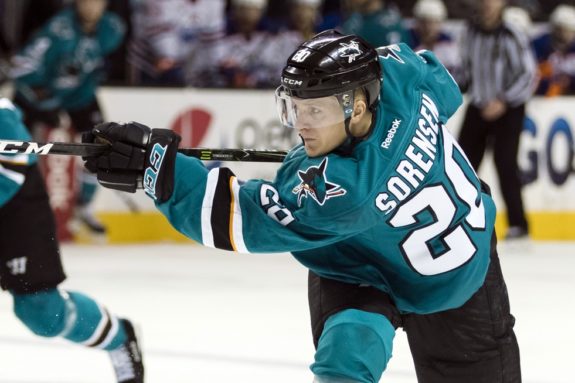
The Sharks’ early lead proved critical, as the Ducks started taking over the game around the midpoint of the opening period.
The Bonkers Power Play
In the second period, Anaheim continued control of play, if not control of the scoreboard. It was their best period of the series. Quality shots on goal became infrequent for San Jose. The Ducks had the better chances, including several very good ones, but Martin Jones was up to the task. With a fraction of a second less than one minute remaining in the period, the Sharks were called for a penalty. That fraction of a second, yeah, it meant something.
About half a minute into the power play, Jones made his best saves of the series, including a diving move to prevent Corey Perry from putting a rebound into the net. As the power play continued, the Ducks pressed, and with time expiring, the puck slid across the crease and onto the stick of Getzlaf, who put the puck into the net. But alas, it was a fraction of a second after the period ended – no goal.
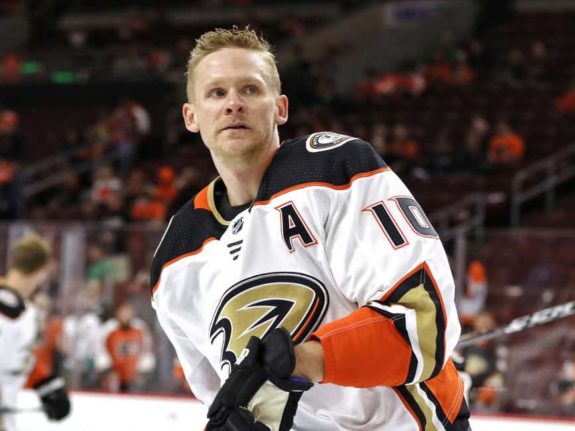
Period three started with Anaheim still on the power play and once again, they managed to get the puck past Martin Jones. But the Sharks challenged the play for being offside, and the goal was overturned. During Getzlaf’s zone entry, he initially put the puck on the blue line, but not over it. In all, the power play featured a brilliant save sequence from Jones, then two shots which got past him – and neither counted.
The Finale
The Ducks, with their nonsense from prior games toned down, played another strong period, eventually getting the tying goal from Andrew Cogliano off an excellent feed from Ryan Kesler. The Sharks answered shortly thereafter with a goal from Tomas Hertl. Hertl battled Getzlaf behind the Ducks’ net, forcing the Ducks captain to attempt a clearing play up the boards. Marc-Edouard Vlasic kept the puck in at the blue line and sent a point shot towards the net. Hertl moved into the slot and the puck ticked off his lower leg, deflecting past Gibson for the go-ahead score. The Sharks led 2-1 and held the lead through a tense final 11 minutes.
The Sharks’ Series
No doubt Sharks fans are joyful with the series win. Still, I can’t help but think fans were cheated out of an intense and highly competitive series by the Ducks’ lack of poise and discipline in the first three games. They essentially gave away each game in a foolish and vain attempt to throw the Sharks off their game. Had the Ducks decided to play hockey in those games, the series would have been a lot different and a lot closer. Ducks coach Randy Carlyle has a lot to answer for, and I can’t imagine any answers will suffice.
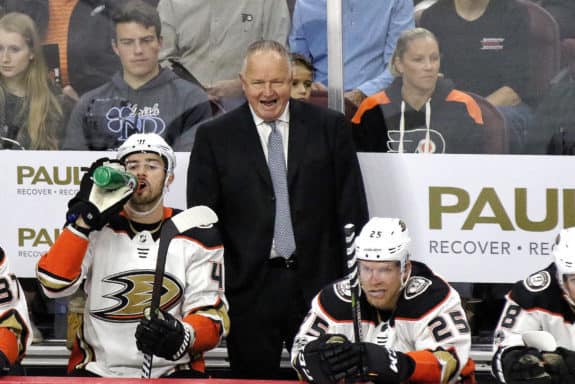
Ultimately, the Ducks cheated on themselves and deserved their fate. They seemed to know it, too. Anaheim had more playoff experience than any other team in this year’s tourney; this isn’t a team that should need to learn a basic lessons. And yet, they failed at one of the most basic of basics: show up to play.
The whole series should have looked a lot more like Game 4. The finale was thing of beauty, with both teams playing at a high level. Unfortunately for the Ducks, it was the only time they brought this quality game all series. Jones stole the game, with a bit of help from the time clock, a video review and some ‘just fortunate enough’ bounces.
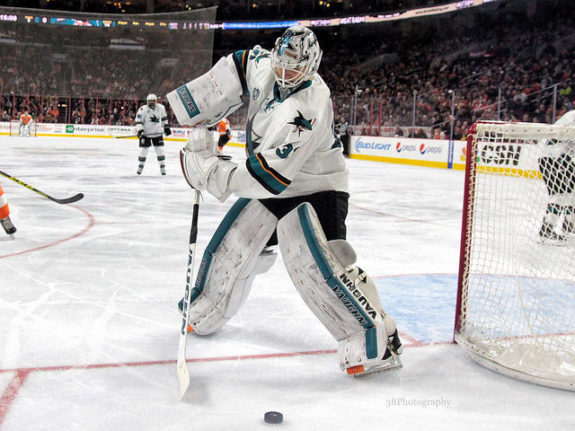
Game 4 was really the first playoff-style game of the series—the sort of close, challenging game the Sharks can expect for most of the rest of their remaining time in this season’s run. Teams need to find ways to win these nail-biting games, and San Jose did just that. Their upcoming opponent in Round 2, the Vegas Golden Knights, swept their series against the Los Angeles Kings and all four wins were one-goal nail-biters. All four Vegas wins resembled Game 4 of the Sharks-Ducks series.
There is little question about the Sharks’ most valuable player for the series; it was Jones. The Sharks’ fourth line, especially Sorensen, made a major difference. They scored four goals, equaling the Ducks’ total for the entire series. The Ducks actually did pretty well containing the Sharks’ top line of Evander Kane, Joe Pavelski and Joonas Donskoi. The Sharks’ depth was a difference maker. On this front, Vegas, with its own excellent depth, promises to be a more challenging matchup.
Questions Answered
We looked at three important questions prior to the series, and each was answered. Joe Thornton wasn’t available, so he had no impact. Paul Martin was solid as Brent Burns’ partner. The pairing was only on the ice for one even-strength goal against. Further, there was a relative calmness in Burns’ game, which bodes well for the Sharks against Vegas. And yes, Vlasic and his defensive partner Justin Braun were able to slow down Getzlaf and his formidable line.
The question I missed asking was about the Sharks’ fourth line. Eric Fehr came back strong from injury, Melker Karlsson looked more like his former self and Sorensen took a massive step forward. It turns out, the Sharks’ fourth-line players were an important answer to a question I should have asked.
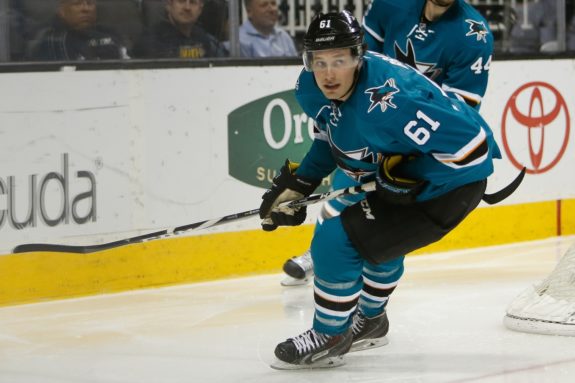
Overall, though, it’s really hard to give the Sharks too much credit in a four-game sweep where the Ducks embarrassingly self-destructed three times. The Sharks kept their poise while Anaheim didn’t bother to show up with any until the finale. This was the critical difference in the series. Both teams played with poise in the series finale, but only one team had room for error. The Sharks played well enough to stay in the game. With the help of a bit of puck luck and some brilliant goaltending, they won the game and finished off the series.
For the Ducks, an ugly post-mortem awaits. Make no mistake, it deserves to be ugly.
For the Sharks, they beat a team that decided to beat itself in three of the four games. The Sharks wisely allowed the Ducks to do it. For their reward, the Sharks are the team moving on to the next round.